Where is our true home? Is it a particular place with particular people within a particular culture? What if we had to leave our “home”? Or grew up in a culture vastly different from that of our parents’?
Main Hương, Hồng Anh, and Janny, three international Wake Up sangha core members, explored these questions deeply during a retreat in Plum Village Monastery, France for young Asian diaspora.
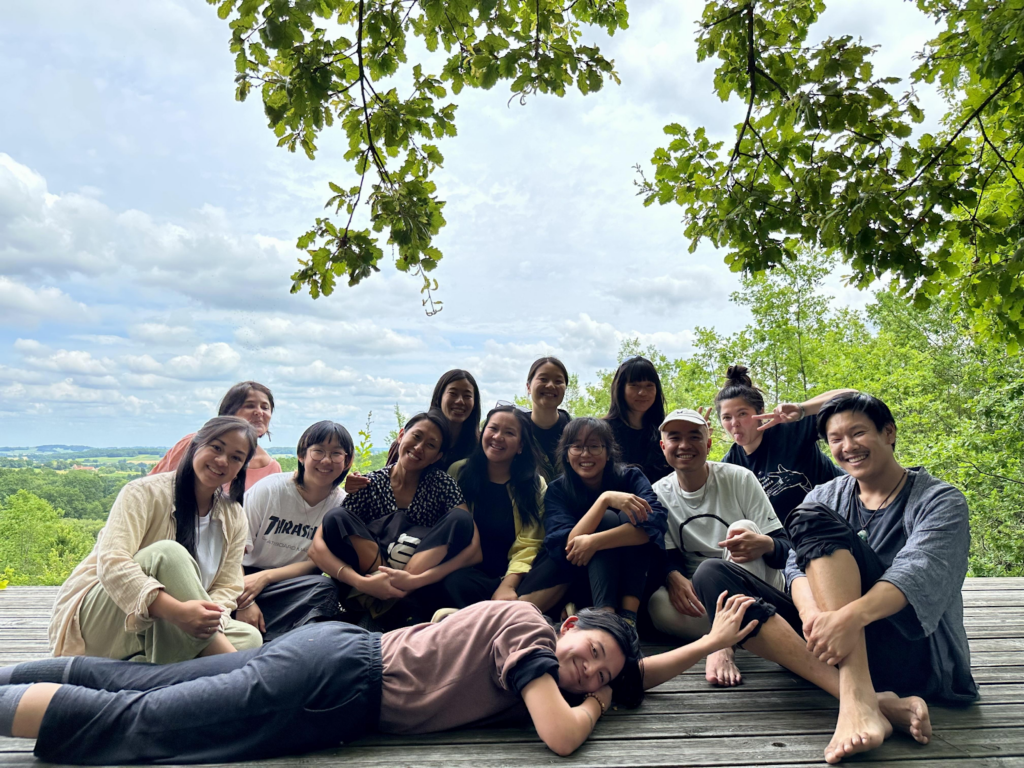
In what way is this retreat different from the others you’ve attended?
The recent retreat held at Plum Village Finding Our True Home was the first retreat specifically for young Vietnamese and Asians from the diaspora. We have never seen so many young Asian friends together during one retreat in Plum Village before. While we enjoyed meeting friends from around the world in Plum Village, we also longed to connect with friends with whom we could share our background and experiences. In other retreats, it often felt like we had to deliberately seek out these spaces which mirrored an experience that many of us had growing up: as minorities where there might have been 1-2 friends in school or at work who shared a similar background.
Attending the retreat surrounded by those who shared a similar upbringing and the challenges of being disconnected from our Vietnamese culture and our parents’ experiences was incredibly empowering. There was such a deep understanding without needing to exchange many words. In her Dharma talk, Sister Lang Nghiem shared about the four elements of true love and reminded us that Thay taught us that love is understanding. “True love is limitless, so is understanding and vice versa.” We felt that during this retreat we all touched a deep love that is hard to put into words: unconditional love from the monastic sisters, love for our parents and our ancestors, love for our roots that we had long thought were buried, love for our cultural practices, and love for ourselves.
During this one week that provided us a safe space, everyone practiced wholeheartedly. Every little activity became meaningful and sacred: during one gathering before our working meditation, Sister Loc Uyen (“Sister Deer Park”) invited us to sing “Happiness is here and now” and to dedicate this song to our parents. She reminded us that our parents might not have had the opportunity yet to “let go of their worries”, and that we can offer them our peace and freedom while singing this song. Many friends were moved to tears. We have never seen this before.
The collective energy and quality of practice also felt very special. Sister Loc Uyen shared that as Asians, our ancestors have transmitted the seeds of the Buddhist practice for centuries. So even though we haven’t practiced for many generations it only takes a sprinkle of water and the seeds would spring up like mushrooms. Combined with a strong presence of the beginner’s mind, the awakened seeds in us and the deep gratitude for having such a special space for our community to come together, created a very unique atmosphere.
Sometimes, we don’t realise something is missing until we find it right in front of us. This feeling of (finally) coming home and being able to connect with others was very unique. It was a reminder that we were not alone in our journey of healing and transformation and that we could find solace and strength in the company of others who understood our experiences intimately.
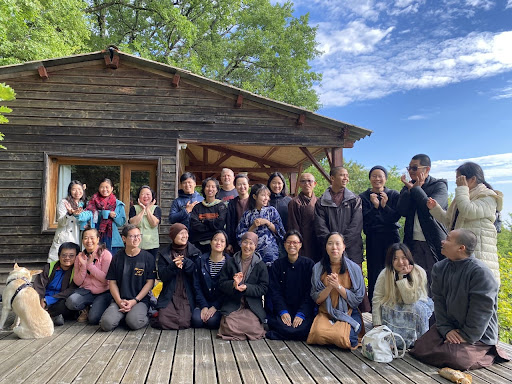
How did the retreat experience impact your understanding of your Vietnamese heritage and your sense of home and belonging?
Many of us grew up as the children or descendents of Vietnamese refugees displaced by war and colonialism. Our families did the best they could given their difficult circumstances from the deep loss of their homeland while trying to navigate a different society and culture in a new country. Our sense of Vietnamese heritage was limited to our families, and often took the backseat to the heritage of the places we grew up in.
Fractured from their homeland, our family transmitted to us the language and culture as best as they could while focusing on providing for us. Being brought up in a Western society, we were often torn between wanting to assimilate to Western ideals and the different ideals our families had, which often led to a rejection of our origins in order to fit in. As adults, many of us feel this loss of culture, language and heritage and a longing to reconnect and heal this part of us that we have long rejected. During this week, we were able to allow ourselves to mourn and reconcile with this wound in us by creating positive experiences which nurture and heal them.
By coming together and sharing these experiences in this space of mutual understanding, we were able to not only heal but also generate a sense of community together despite living in different countries and cities. We were able to cultivate deeper compassion for ourselves, our parents, and our friends. With this, we’re able to hold space for ourselves and our pain and joy, to heal the past, celebrate our culture and create a sense of home and belonging together and within ourselves.
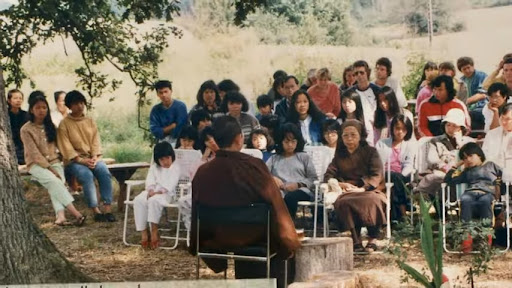
When we had lunch underneath the oak tree, Sister Dinh Nghiem shared with us that Thay gave his first few Dharma talks right here. People of our parents’ generation who came to Plum Village back in the 80s, only years after the war had ended, would sit around him listening. Back then, mostly Vietnamese refugees and people who lived in exile like Thay, came to Plum Village because it was a community place where they could seek not only spiritual but also cultural refuge. In this beautifully loving and nurturing environment, our parents were able to transform their open wounds and allow their children, us, to tend to our roots. Here children could learn how to sing and speak Vietnamese, Vietnamese food was cooked and the community could come together to experience a sense of belonging in this place that was home away from home. They helped Thay and the monastics build and shape the Plum Village as we know it today.
Now, 40 years later, we sit underneath the same oak tree. Thay is still present all around us – when a breeze of wind prompts the leaves to send us a warm welcome or when we walk mindfully through the forest in Lower Hamlet. We are so fortunate to continue this beautiful legacy of Thay and our parents. To see that Plum Village can also be a place where we, just like our parents, continue to celebrate our culture and heal the wounds of our ancestors, was so meaningful.
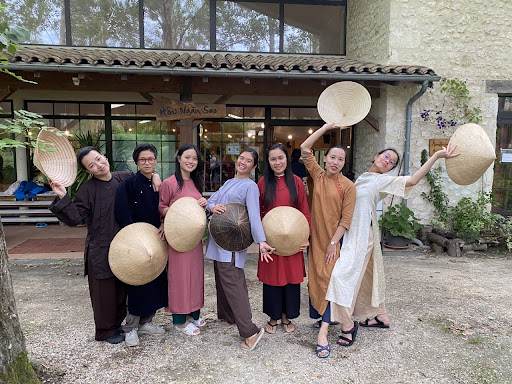
What aspect of this setting was especially transformative?
Being surrounded by such a strong presence of the Vietnamese language in all the activities was very touching. It was the first time for many of us to hear the orientation of a Plum Village retreat in Vietnamese. For Sister Bien Nghiem and Sister Thuy Nghiem to welcome us in their mother tongue made us feel immediately at home. You could really feel that they were sharing from their heart and that it went straight to our hearts. We’ve never seen so many people cry during orientation.
To hear some of the teachings in Vietnamese added an additional layer to the practice. Especially listening to the chanting in Vietnamese was such a powerful and memorable experience. It allowed us to connect, explore and experience Vietnamese culture on a deeper level.
For many of us who are part of the post-war generation, we’re only ever exposed to Vietnamese at home. Often this language has transmitted so much suffering and violence to us. But here in Plum Village, we get to hear the language used with so much peace and love. It’s so hard to put into words the sense of full embrace, generosity, love and care that the sisters gave to us. In Vietnamese we say thương, which describes a very deep, unconditional love – and that’s what we felt throughout the whole week.
What are your hopes and wishes from now on?
Our hope is that this retreat can continue and be a space where the Vietnamese diaspora can return to and feel at home.



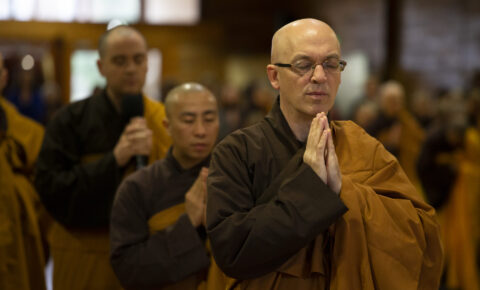
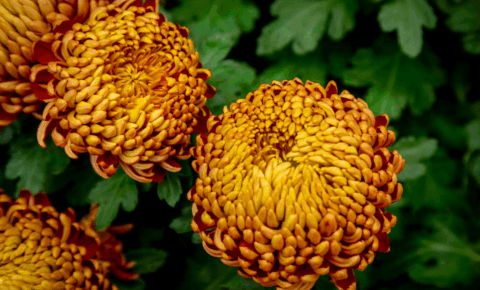
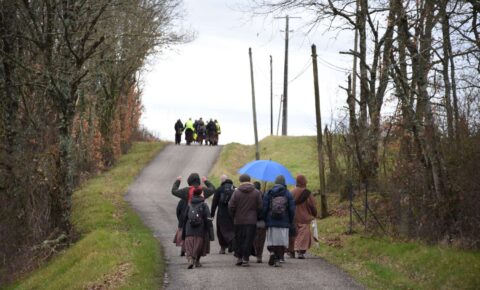
Please share with us your practice of finding your true home